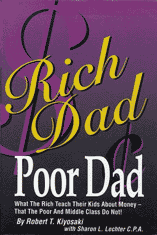
Rich Dad, Poor Dadby Robert T. Kiyosaki with Sharon L. Lechter, C.P.A. 2000, Warner Books, ISBN: 0-446-67745-0 I rank Robert Kiyosaki's Rich Dad, Poor Dad as one of the most educational and practical books I have ever read. I learned more about money, work and asset creation in this slim book than in 20 years of schooling. Kiyosaki's biological father (a respected professor, "Poor Dad") struggled with money his entire life; while his friend's dad ("Rich Dad") created immense wealth. As a boy, Kiyosaki was presented with two belief systems about wealth: Poor Dad placed value on working "to get ahead" (the path of education, good job placement, a long career and retirement), while Rich Dad placed value on acquiring assets. Kiyosaki shows how the traditional Poor-Dad approach leads to a life of struggle and debt burden, while the non-traditional Rich Dad approach will create a life of freedom from the "Rat Race" -- eliminating the need to work for money. While reading Rich Dad, Poor Dad you will learn to distinguish between assets ("things that feed you") and liabilities ("things that eat you"). You will learn why the poor and middle class don't get ahead even when they earn more money with a second job or a pay raise. Most importantly, you will learn that money works according to simple rules -- you can curse those rules, or you can work with them to generate a "passive income" that pays your bills whether you choose to follow creative pursuits, implement a social justice program, or just play on the beach. Thus Kiyosaki illustrates the true meaning of wealth: the freedom to do your dream while your assets generate a passive income that "works for you" -- and pays your monthly bills. Kiyosaki shows very clearly how "the rich don't work for money" (Lesson One), and how "the rich invent money" (Lesson Five). He highlights the difference between the Rich Dad and Poor Dad beliefs with humorous stories and examples. Rich Dad, Poor Dad will awaken you to the importance of financial intelligence. Once you recognize that financial intelligence simply means the ability to distinguish assets from liabilities you'll understand that simple choices are the foundation for wealth, and that asset create is not risky or complicated. For example, the principle "pay yourself first" is deeply ingrained in the Rich-Dad approach; applying this simply means that personal investment takes place before consumer spending. This choice can make the difference between being penniless or having a steady stream of income at age 65. I feel that this book is so transformative that it should be required reading in every high school. Kiyosaki also produces board games that teach the essentials of his financial-literacy approach in an easy-to-understand and fun manner (Cashflow® for Kids, Cashflow® 101, and Cashflow® 202). Once you understand how wealth creation works, you'll understand that the rat race has an exit ramp--taking that exit is up to you.
|